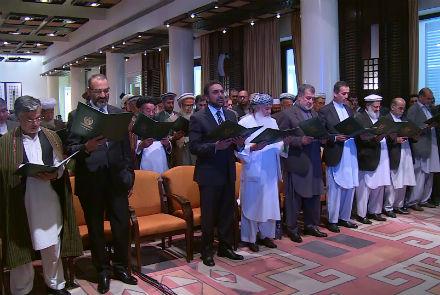Leaders from the Jamiat-e-Islami Afghanistan party gathered in Kabul on Tuesday where they announced the party’s interim leadership council and increased the number of its members to 64 from nine members previously.
At this event, Salahuddin Rabbani, acting minister of foreign affairs and the interim chairman of Jamiat-e-Islami party reiterated his calls for a change in the country’s political system from “centralized to parliamentary” and said “monopolization is rejected under any context and it poses serious harms to Afghanistan and its people”.
Rabbani said Jamiat will participate in the next elections from a stronger platform.
“With the consideration of Afghanistan’s social structures, Jamiat-e-Islami Afghanistan believes that parliamentary system is one of the most moderate systems of governance to prevent monopolization and political repression,” Rabbani stated.
Salahuddin Rabbani, Balkh governor Atta Mohammad Noor, former Herat governor Mohammad Ismail Khan, former envoy of President Ashraf Ghani for reforms and good governance Ahmad Zia Massoud, former vice president Mohammad Younus Qanooni, Kaleemullah Naqibi, Abdul Sattar Murad, Enayatullah Shadab, Mohammad Nasim Faqiri and Abdul Shakur Waqif Hakimi are the leading figures of Jamiat’s interim leadership council.
However, the names of the CEO Abdullah Abdullah and state minister for reforms in security and defense sectors, Amrullah Saleh, are not included on the list of the new leadership council.
“Mr. Abdullah has not announced his joining in the leadership council of Jamiat maybe because of the special reputation he owns now. But we hope that these dramatic obstructions come to an end in the future,” Jamiat’s spokesman Waqif Hakimi said.
The Jamiat party was initially established 60 years ago.
Sources say that Jamiat has been grappling with internal disputes after the assassination of its founding leader Burhanuddin Rabbani.
It is said that members of the party have so far failed to organize their congress.
Burhanuddin Rabbani, who served as president of Afghanistan in 1990s and later as chairman of Afghanistan High Peace Council under former president Hamid Karzai’s government, was assassinated in a suicide bombing at his residence in Kabul in 2011.


